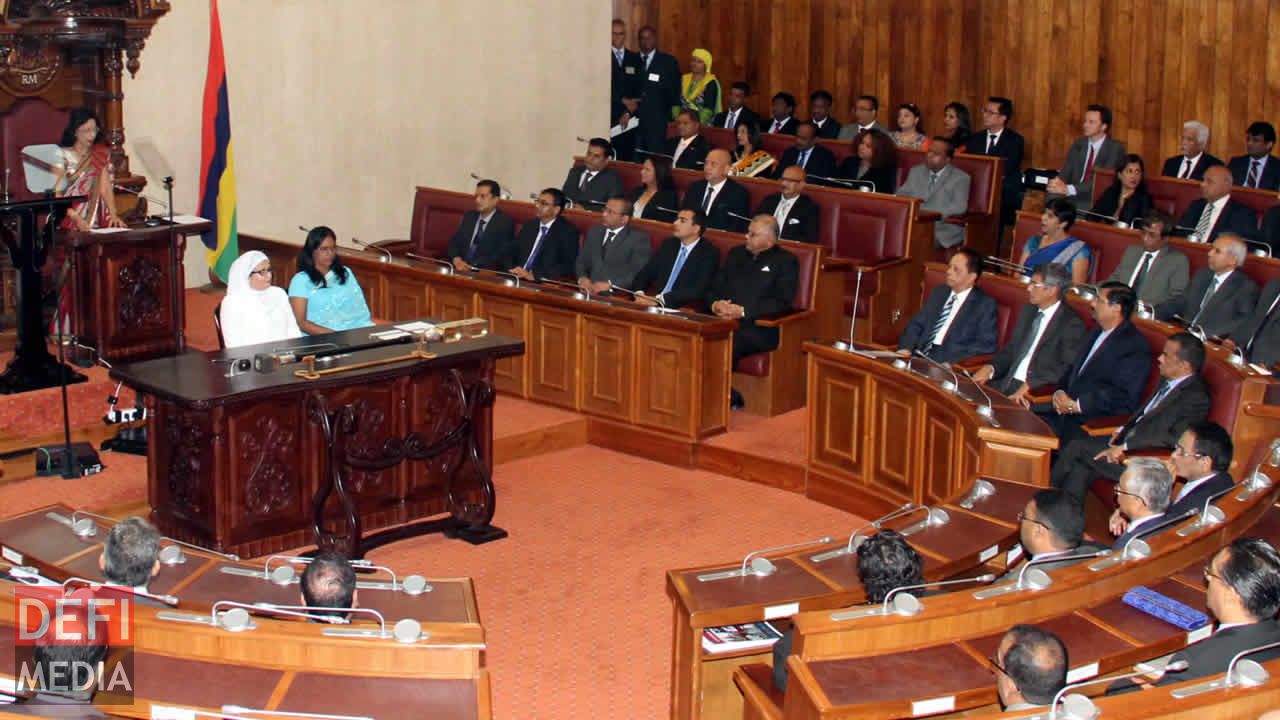
Début des débats mercredi après-midi 31 août à l’Assemblée nationale sur le Finance (Miscellaneous Provisions) Bill.
Publicité
Ce projet de loi a été présenté en seconde lecture par le ministre des Finances Pravind Jugnauth. Une fois voté, le Finance Bill permettra la mise en application des mesures du Budget 2016-17.
Les amendements contenus dans le Finance Bill ont été présentés à l’Assemblée nationale. Pravind Jugnauth a été le premier à intervenir. Le député MMM Reza Uteem lui a donné la réplique.
Le Finance Bill fait provision pour des amendements à la Central Electricity Board (CEB) Act. Ces amendements devraient faciliter et démocratiser le développement des énergies renouvelables.
Le Finance Bill fait aussi provision à des amendements à l’Education Act pour faciliter la mise en application du projet 9-Year Schooling.
Reza Uteem estime que les amendements qui seront apportés à travers le Finance Bill « viennent jeter les bases d’une mauvaise gouvernance ». Selon lui, des questions sur le CEB ou encore la State Trading Corporation (STC) à l’Assemblée nationale ne « pourraient plus être répondues ».
La ministre de l’Éducation Leela Devi Dookun-Lutchoomun a donné elle la réplique au MMM. Elle a répondu à Steven Obeegadoo qui, en conférence de presse mercredi matin 31 août, a demandé au ministre des Finances de retirer des amendements majeurs ayant trait au secteur de l’éducation dans le Finance Bill. Il souhaite que ces amendements soient débattus à la prochaine rentrée parlementaire.
Leela Devi Dookun-Luchoomun a déclaré que lorsque Steven Obeegadoo était ministre de l’Éducation, « il n’y avait même pas de débat à l’Assemblée nationale » ; ajoutant que le secteur de l’éducation est condamné à évoluer.
Aurélie Auguste
Ci-dessous le Finance Bill présenté en seconde lecture par Pravind Jugnauth :
THE FINANCE (MISCELLANEOUS PROVISIONS) BILL
(No. XX of 2016)
-------------------------------------
SECOND READING SPEECH BY THE MINISTER OF FINANCE & ECONOMIC DEVELOPMENT
Madam Speaker,
- I move that the Finance (Miscellaneous Provisions) Bill 2016 be read a second time.
- Madam Speaker, the main purpose of the Bill is to give legal effect to measures announced in the Budget Speech and its annex and for matters connected, consequential or incidental thereto.
- Thus, Madam Speaker, the Finance (Miscellaneous Provisions) Bill (2016) brings amendments to 58 enactments.
- I will elaborate on the main amendments of the Bill starting with the banking sector.
The amendments to the Bank of Mauritius Act and the Banking Act relate mainly to the need to strengthen the regulatory framework, especially in the wake of events that have rocked the banking system last year and revealed a number of weaknesses. Other amendments relate to promoting the development of the banking sector.
Bank of Mauritius Act
5. Thus Clause 2 amends the Bank of Mauritius Act as follows:
(a) to grant the Bank of Mauritius authority to regulate and supervise ultimate and intermediate financial holding companies that have at least one subsidiary that is a bank or a non-bank deposit-taking institution;
(b) to allow the Bank of Mauritius to grant advances to financial institutions and such other entities only against securities issued by Government or the Bank of Mauritius instead of “against such security as the Board may determine”;
(c) to provide for new families of currency notes and coins to be issued after the concurrence of, instead of consultation with, the Minister of Finance; and
(d) a new section 50A is being added for the Central Bank to issue Rules without the need for prior approval of the Minister and these shall be published in the Gazette;
FINANCIAL STABILITY
To strengthen financial stability, amendments are made to:
- provide for better coordination among the Central Bank, the Financial Services Commission and Statistics Mauritius;
- empower the Bank of Mauritius to use data maintained in the Mauritius Credit Information Bureau for supervisory purposes and financial stability assessment; and
- include the Minister responsible for financial Services as a member of the Financial Stability Committee.
Banking Act
6. Clause 3 amends the Banking Act as follows:
(a) to remove “investment banking business” from the definition of “bank” so that only the Financial Services Commission regulates that business with a view to preventing regulatory arbitrage;
(b) to add a definition of private banking business and cater for private banking business;
(c) to add a new section 3(8) for the provisions of the Banking Act to prevail in the event of any conflict or inconsistency with provisions of other laws, other than sections 110A and 110B of the Insurance Act;
(d) to provide for subsidiaries of financial institutions incorporated outside Mauritius to submit to the BoM, within one month after publication, a copy of their audited annual consolidated financial statements with a view to facilitating consolidated supervision;
(e) to allow for the Central Bank to carry out an independent valuation of the assets which a bank holds as collateral;
(f) to provide for a Receiver to discontinue the operations of a bank which has been placed into receivership instead of continuing its operations; However, the Central Bank can still appoint a conservator to continue the operations of the bank;
(g) to add a new section 79A to enable a simplified licensing procedure for a temporary financial institution to take over the assets and liabilities of a financial institution which has been put into receivership by the Bank of Mauritius; and
(h) to make it mandatory for banks to rotate audit firms instead of its partners every 5 years.
Financial Reporting Act
7. In the same vein, Clause 23 amends the Financial Reporting Act to make it mandatory for audit firm for companies listed on the stock exchange to rotate every 7 years.
Building Control Act
8. Clause 4 amends the Building Control Act to:
(a) extend the definition of “principal agent” to also include firms of architects or engineers registered under the Construction and Industry Development Board Act.
(b) make provision for plans and drawings that support an application for permit with respect to a proposed construction work to be submitted electronically or such other technological means; and
(c) reduce the time frame for the issue of a compliance certificate by a local authority from 10 to 5 working days from the date of application.
Business Registration Act
9. In order to enhance exchange of information, Clause 5 amends the Business Registration Act to provide for the Registrar of Companies to be able to issue business registration card electronically;
Central Electricity Board Act
10. To facilitate and democratise the development of local renewable sources of energy, Clause 6 amends the CEB Act to provide for the setting up of companies. These companies shall be exempted from the Public Procurement Act and their shareholdings will be opened to small investors.
11. And Clause 15 amends the Electricity Act to simplify the procedures for approving applications by small and medium scale electricity producers generating less than 2 MW of electricity from renewable sources.
Civil Aviation Act
12. Clause 7 amends the Civil Aviation Act to stop crediting the proceeds of the Passenger Solidarity Fee on airline tickets to UNITAID and credit to the Consolidated Fund instead.
Code Civil Mauricien
13. Clause 8 amends the Code Civil Mauricien to bring clarification to the application of Article 2202-6 of the Code Civil Mauricien regarding capitalisation of interest. Henceforth, this Article will be subject to Article 1154 which does not allow the capitalisation of interests which are due for less than a year.
Companies Act
14. In line with our policies to facilitate business, Clause 9 amends the Companies Act:
(a) to provide for the appointment of an administrator instead of a liquidator in the event of winding up a limited life company;
(b) for the Registrar of Companies to remove a company from the Register where an objection lodged before 1st July 2009 has not been withdrawn; and
(c) to allow for a process where undisposed funds available when companies are being removed from the Register to be vested in a Companies Special Deposit Account or the Curator of Vacant Estates as the case may be.
Customs Act, Customs Tariff Act and Excise Act
15. Clauses 11, 12 and 18 amend the Customs Act, the Customs Tariff Act and the Excise Act, respectively to implement the measures announced in the Budget Speech and its Annex relating to customs and excise, including
(a) empowering Customs to suspend the clearance of goods suspected to be counterfeit for a maximum of 21 days instead of 3 days, in the context of the fight against counterfeit trade;
(b) harmonising the procedure for compounding of customs offences with that obtaining under other revenue laws; and
(c) allowing the heirs of a deceased owner of a duty free motor vehicle not to become liable to pay the remaining proportionate excise duties, provided that the vehicle is not disposed of within the duty liability period.
Underpasses - Dr A Ferriere and Sir William Newton
16. The Dr A Ferriere Underpass, Port Louis (Authorised Construction) Act 1996 and the Sir William Newton Underpass, Port Louis (Authorised Construction) Act are amended to exempt the State Property Development Company Ltd (SPDC) from the payment of annual fee to Ministry of Housing and Lands and Municipal Council of Port Louis as SPDC is servicing both underpasses at its own cost.
Education Act
17. Clause 14 amends the Education Act to provide for the phased implementation of the Nine-Year Continuous Basic Education project and transitional arrangements.
Environment and Land Use Appeal Tribunal Act
18. In Clause 16, the Environment and Land Use Appeal Tribunal Act is being amended to reinforce and remove ambiguity in the process for determining and hearing of appeals.
Environment Protection Act
19. Clause 17 amends the Environment Protection Act to provide the legal framework for the financing of new e-waste management systems that are set up jointly with the private sector.
Finance and Audit Act
20. Clause 19 amends the Finance and Audit Act to avoid having to amend the Schedules to the Act at Budget time in case there has been a change in the portfolio of a Minister and in the appellation of a Ministry or Department.
Financial Intelligence and Anti-Money Laundering Act
21. Consequential amendment is being made for holders of investment banking licences, co-operatives credit unions, global legal advisory services licence and captive insurance licence to fall under the purview of the Financial Intelligence and Anti-Money Laundering Act.
Financial Services Act
22. To further diversify and consolidate the financial services sector, a new Part XA is also being added to the Financial Services Act to provide for an umbrella licence for investment banking.
23. New sections are being added to the Financial Services Act to allow the Financial Services Commission to issue a new Global Legal Advisory Services Licence to cater for flagship international law firms to set up offices and operations in Mauritius.
24. Clause 24 amends the Financial Services Act to allow Global Business Companies category 2 to invest in listed companies on the stock exchange and to empower the FSC to set up a standardised centralised online KYC database for the non-bank financial services sector.
Gambling Regulatory Act
25. As regards the gambling sector, the Gambling Regulatory Act is being amended to provide for:
(a) the introduction of a 2 percent levy on the gross gambling yield of all licensees;
(b) setting up of a regulatory and taxation framework for on-line betting which will be opened to non-resident and foreign punters only;
(c) betting games to be organised in hotels and restricted to non-residents and foreigners;
(d) an increase in the betting duty for horse-racing bookmakers operating outside the racecourse; and
(e) for 50 percent of the net proceeds from the Mauritius National Lottery (Lotto Lottery) to be credited to the Lotto Fund which will be set up as a Special Fund under the Finance and Audit Act.
Hire Purchase and Credit Sale Act
26. Clause 26 amends the Hire Purchase and Credit Sale Act to make it clear that interests cannot be charged on any amount that has been prepaid.
Income Tax Act
27. Clause 27 amends the Income Tax Act to inter-alia give effect to the revision in personal income tax allowances, exemptions and tax holidays granted to qualifying enterprises, review the investment tax credit and implement the changes in tax administration as announced.
28. Madam Speaker, I now come to Corporate Social Responsibility. Clause 27(h) amendments to the Income Tax Act as follows:
First, Companies will be required to contribute through MRA at least 50% of their CSR money to the new National CSR Foundation at the start of their next accounting year. Thus, for companies with accounting period ending 31 December 2016, the new CSR framework will be applicable as from 1st January 2017. The rate of contribution will be changed to at least 75% in the following year.
Second, provision has been made to list the six national CSR priority areas in the Tenth Schedule to the Income Tax Act. Moreover, a number of activities which do not qualify for funding under CSR are also specified. Detailed operational guidelines will be finalised by the Foundation after consultation with stakeholders.
It is proposed to set up the new National CSR Foundation under the Foundations Act and will be under the aegis of the Ministry of Social Integration and Economic Empowerment. It will be managed by a Council, comprising a Chairperson, and members from the private sector, public sector and civil society.
Third, provision has also been made to enable a company or its foundation to continue using its CSR money on an existing or a new CSR Programme, provided it fits within the priority areas, and is approved by the National CSR Foundation.
And fourth, a company may use the balance of its annual CSR Fund to continue providing funding to the CSR Programmes into which it was already engaged prior to August 2016. However, as from 1st January 2019, it will be required to spend the balance in accordance with the 6 priority areas identified and announced in the Budget Speech or other areas as may be prescribed.
29. As regards tax administration I wish to highlight that Clause 27(t) allows the Director-General to raise an assessment beyond the three years limit in the case of non-submission by a taxpayer of his tax return on income.
30. Furthermore, to counter abuse cases where a tax payment has been collected by companies on behalf of the State such as PAYE and TDS but not remitted to MRA, provision is made for the Director-General of the MRA to claim a penalty not exceeding 50%. In addition, the maximum imprisonment term on conviction of such an offence is being increased from a maximum of 2 years to 8 years.
31. Provision has also been made to improve the Investment Tax Credit Scheme on expenditure in new plant and machinery by qualifying companies as follows:
(i) removal of the minimum qualifying amount of investment of Rs 100 million;
(ii) extension of the number of years any unrelieved tax credit may be carried forward to 10 consecutive income years;
(iii) extension of the investment window to the year 2019/2020;
(iv) raising of the rate of the investment tax credit to 15% over 3 years for companies engaged in manufacture of textiles, wearing apparels, ships and boats, computers, pharmaceuticals or in the production of films industry;
(v) the credit is being extended to a company investing in the share capital of a subsidiary company engaged primarily in the setting up and management of accredited business incubators and accelerators; and
(vi) clarifying that the period during which unused tax credit under the special tax credit scheme for investment in a spinning, weaving, dyeing or knitting of fabrics factory should have been 6 instead of 5 income years.
Investment Promotion Act
32. Madam Speaker to unlock major investment projects and give a boost to innovation, Clause 29 amends the Investment Promotion Act to –
(a) Provide that the Investment Projects Fast-Track Committee may request the BOI to issue the relevant permit, licence, authorisation or clearance for a business to start operation in cases where the statutory deadlines for processing of applications by the relevant public sector agencies have lapsed.
(b) And a new section is added on the Regulatory Sandbox Licence (RSL). The Licence will have to be applied to and issued by the BOI to operate innovative projects for which no legal provision has been made or where there are inadequate provisions in the relevant enactments.
Land (Duties and Taxes) Act and Registration Duty Act
33. Clauses 30 and 43 amend the Land (Duties and Taxes) Act and the Registration Duty Act to inter-alia give effect to the incentives provided in the Budget for the construction or acquisition of a house, namely;
(a) any Mauritian citizen who acquires during the period from 1st September 2016 to 30th June 2020 a newly-built dwelling for an amount not exceeding Rs 6 million, will be granted full exemption from the 5% registration duty. This exemption will also apply to a dwelling purchased on the basis of a plan or during construction (i.e. under Vente à Terme or Vente en l’Etat Futur d’Achèvement). This exemption will not apply in respect of a property that is located on Pas Géométriques or within the Integrated Resort Scheme, Real Estate Scheme, Property Development Scheme or Invest Hotel Scheme;
(b) a first-time buyer of bare residential land will be exempted on the first Rs 2 million of land value provided the area of land being acquired does not exceed 20 perches;
(c) it is clarified that the existing provision enabling a first time buyer of a dwelling that is not newly-built to benefit from registration duty exemption has been maintained;
(d) a Mauritian who, in the past, may have purchased a residential property but did not own any as at 29 July 2016 will qualify as a first time buyer. Furthermore, no age restriction will apply;
(e) under the Construction of Housing Scheme, the upper limit of Rs 4 million of the value of a residence in a project of at least 5 residential units, registered with the MRA, is being raised to Rs 6 million and the scheme extended to 30 June 2020; and
(f) no registration duty will be payable on the registration of a secured housing loan contracted by a Mauritian if the loan amount is below Rs 2 million, instead of the current limit of Rs 1 million. This amendment will be made by way of regulations.
34. The exemption from land transfer tax on the transfer by an employer to his employee of a free social dwelling.
35. Madam Speaker, opportunity is being taken to correct an unfairness relating to the sharing, following a divorce, of an immovable property that has been acquired under the communaute des biens. Currently such sharing is subject to registration duty. This is unfair because it implies double payment of registration duty on the same property. Thus, in such cases there will be no registration duty when the property is being transferred from one spouse to the other. This will be made by way of regulations.
Law Practitioners Act
36. Consequential amendments are being made to the Law Practitioners Act regarding the setting up of Global Legal Advisory Services in Mauritius. The Law Practitioners Act shall not apply to holders of the Global Legal Advisory Services Licence.
Local Government Act
37. I will now elaborate on amendments relating to local Government. Clause 32 amends the Local Government Act to:
(a) abolish the requirement for obtaining the stand of the Executive Committee, in the process of determining an application for an Outline Planning Permission and a Building and Land Use Permit;
(b) review the composition of the Permits and Business Monitoring Committee, which will now consist of the Lord Mayor or Deputy Lord Mayor, the Mayor or Deputy Mayor, the Chairperson or Vice-Chairperson of a district council who shall be the chairperson; and 4 councillors designated by the Lord Mayor or Mayor or Chairperson, the Chief Executive, and the heads of the Land Use and Planning, Public Infrastructure and Public Health Departments of the local authority;
(c) provide that the Local Authority will have only 8 working days to seek any additional information, particulars or document from an applicant and on the effective date, issue to the applicant an acknowledgement receipt in respect of the application;
(d) add a new provision to exempt economic operators carrying out trade activities whose annual trade fee does not exceed Rs 5,000 at 30 June 2016 from the payment of trade fees, for a period of 3 years as from 1 January 2017; and
(e) restore the provisions relating to the updating of the Valuation List used by Municipal Councils for the assessment and levy of General Rates.
Mauritius Revenue Authority Act
38. Clause 34 amends the Mauritius Revenue Authority Act to provide, inter alia, for an Alternative Tax Dispute Resolution mechanism at the level of the MRA to expedite tax appeal cases.
Medical Council Act
39. The Medical Council Act will be amended to provide for a prospective doctor to be assessed before his enlistment as a pre-registration intern with a view to ensuring that he has the required knowledge, standard, skills and competence.
Morcellement Act
40. The Morcellement Act is amended at Clause 36 to provide that an application for a morcellement permit be made in one original copy and accompanied by the required supporting documents specified in the guidelines; and for the morcellement permit to be issued by the Minister not later than 5 working days from the date reported to him by the Morcellement Board.
National Pensions Act
41. The National Pensions Act is being amended to provide for:
(a) entitlement of a widower to receive a pension from the National Pensions Fund after the death of his spouse who has been making financial contributions to the Fund;
(b) payment of Basic Invalidity Pension in respect of a child with disabilities who is below 15 years of age; and
(c) option for an employee and his employer to effect higher amounts of contributions to the National Pension Fund than the statutory ceiling, with a view to securing higher benefits from future pension.
National Savings Fund Act
42. National Savings Fund Act is being amended to enable contributors of National Savings Fund, who retire before or stop being in employment before the age of 60, to receive their lump sum payments at 60.
Non-Citizens (Property Restriction) Act
43. In Clause 39, the Non-Citizens (Property Restriction) Act is being amended so that companies in which non-citizens in total do not hold more than 25 percent of the shareholding will not be required to seek the approval of the Prime Minister’s Office when there is a transfer of property.
44. I should here point out that I am bringing an amendment to this Clause as it stands now in the Finance Bill to better reflect the policy measure announced in the Budget Speech.
45. The Act is also being amended to allow non-citizens, registered with the BOI, subject to security clearances, to acquire apartments in a building of at least two floors above ground floor.
Public Debt Management Act
46. Clause 40 amends the Public Debt Management Act to:-
(a) specify that the proceeds from Treasury Bills and other government securities that are issued for monetary policy purposes shall be deposited at the Bank of Mauritius and used only for redemption of those securities; and
(b) provide that the Minister may require a risk assessment exercise to be carried out prior to acceding to a request by a public entity for a guarantee on a loan.
Public Private Partnership Act
47. The Public Private Partnership Act is being amended to allow the BOT Projects Unit to oversee all matters pertaining to public private partnerships with a view to avoiding duplication of resources and aligning the PPP process with the BOT Projects process.
Public Procurement Act
48. Madam Speaker, the Bill also adapts the Public Procurement Act to new needs and to ensure greater value for money. Thus the Public Procurement Act is being amended for a public body to
(a) seek prior approval of the Central Procurement Board before amending works contract where there are significant variations in the contract value;
(b) cancel a bidding exercise where substantial modifications are required in the bidding documents and where there is an IT system failure for procurement;
(c) be exempted from the Act in relation to the purchase, maintenance and repairs of marine vessels in view of the specialized nature of the market for such activities; and
(d) limit award of the number of lots to suppliers based on criteria to be included in the bidding documents for a better allocation of contracts and improved delivery of goods, works and services.
49. The amendment to the Public Procurement Act also enables a public body to proceed directly with an open invitation for bids where the public body has previously carried out a prequalification exercise which was unsuccessful thus minimizing risks of delays and cost escalation.
Representation of the People Act
50. Clause 46 amends the Representation of the People Act to allow for notices by the Electoral Supervisory Commission and Electoral Commissioner to be made also in electronic form.
Securities Act
51. A new definition is being inserted in the Act regarding corporate finance advisory services. This is consequential to the powers being given to FSC to regulate investment banking.
Shooting and Fishing Leases Act
52. Clause 46 amends the Shooting and Fishing Leases Act to provide for eco-tourism activities.
Small and Medium Enterprises Development Authority Act
53. Clause 48 amends the Small and Medium Enterprises Development Authority Act to provide for individuals and cooperative societies, engaged in qualifying activities and registered with SMEDA, to benefit from the SME Development Scheme, i.e. 8-year tax holiday.
Social Aid Act
54. The Social Aid Act is being amended to provide for a standard definition of “household” with a view to rationalising various household income eligibility criteria. Thus, for all in-kind assistance under the Social Aid Act such as hearing aids, spectacles and wheelchairs, it is proposed to apply a uniform household income threshold of Rs 30,000 per month.
55. Concerning the implementation of the new Empowerment Support Scheme under the Marshall Plan against Poverty announced in the Budget which will become operational in December this year, I wish to point out that a separate Bill to that effect will be introduced by my colleague, the Minister of Social Integration and Economic Empowerment.
State Trading Corporation
56. The State Trading Corporation Act is being amended to allow the STC to acquire, hold or dispose of an interest in any corporate body for the purpose of bunkering and petroleum related activities.
Statutory Bodies (Accounts and Audit) Act
57. The Statutory Bodies (Accounts and Audit) Act is being amended to enable a statutory body to remit part of an operating surplus or accumulated revenue reserve arising from special circumstances to its reserve account with the approval of the relevant Minister and transfer the remaining amount to the Consolidated Fund.
Sugar Industry Efficiency Act
58. The Sugar Industry Efficiency Act is being amended, in Clause 52, to provide that an applicant for land conversion can submit only one original copy of an application and can do so electronically.
Sugar Industry Pension Fund Act
59. The Sugar Industry Pension Fund Act is being amended to provide legal certainty that the assets of each employer will be distinct and separate.
Sugar Insurance Fund Act
60. Clause 54 amends the Sugar Insurance Fund Act to allow the payment of a one-off financial assistance to all planters for sugar crop 2015 amounting to a sum of Rs 2,000 per tonne of sugar accrued.
Tourism Authority Act
61. Clause 55 amends the Tourism Authority Act to rationalize the licensing system for similar activities carried out in the tourism sector.
62. Provision is made for the introduction of 3 types of licences, boathouse licence, clubhouse licence and surfing licence. The list of activities and terms and conditions applicable to each type of licence will be prescribed by way of regulations. In addition, the validity of the pleasure craft licence is being extended from one to three years.
63. Operating rental agencies for bus and minibus or for motorcycles will no longer be licensed by the Tourism Authority as these activities are already regulated by the National Transport Authority. Appropriate regulations will be made.
Transcription and Mortgage Act
64. Clause 56 amends the Transcription and Mortgage Act to allow public sector agencies (such as the Financial Services Commission, the Bank of Mauritius and the Mauritius Revenue Authority) and other specified entities as may be prescribed to carry out searches at the Registrar-General’s Department free of charge.
Tourism Employees Welfare Fund Act
65. Clause 56 amends the Tourism Employees Welfare Fund Act for the definition of ‘tourism enterprise’ to also include any hotel-based or airport-based taxi operator. Provision is also made for these operators to make a monthly contribution to the Tourism Employees Welfare Fund according to rates to be prescribed.
Value Added Tax Act
66. The VAT Act is being amended to provide for the implementation of the measures announced in the Budget Speech and its Annex. These include, amongst others,
(a) introduction of a 20 percent penalty to discourage excessive claims of input and increasing the penalty for late payment of VAT;
(b) reviewing the VAT Refund Scheme on Construction of a Dwelling; and
(c) zero-rating of goods and services, such as, photovoltaic batteries and inverters; production of film for export; CCTV camera systems, and burglar alarm systems and sensors.
67. Clause 60 repeals the Shooting and Fishing Lease Tax Act as it is no longer relevant since the lease rentals of State Lands for such purpose have been increased substantially and are in force in all cases.
68. Madam Speaker, the income tax exemption which will be granted to seafarers, co-operatives engaged in non-sugar agricultural activities, industrial fishing companies and in respect of specified financial services will be made by way of regulations.
69. And the exemption from land transfer tax on the transfer by an employer to his employee of a free social dwelling and correction of an anomaly relating to sharing of immovable property following a divorce will be made by way of regulations.
70. Madam Speaker, I will also bring certain minor amendments at Committee Stage to some Clauses of the Bill, namely:
- Clause 4 on the Building Control Act to clarify that the online application for Building and Land Use Permit be made in respect of building having a floor area of more than 150 square meters.
- Clause 23, on the Financial Reporting Act to provide for transitional provision for rotation of auditors of listed companies.
- Clause 27, to remove the figure of six in relation to the CSR priority areas of intervention in Section 50 L of the Income Tax Act as well as in its Tenth Schedule.
- Clause 32, to remove sub-paragraph (i) at Section 117 of the Local Government Act as the provision is already covered in the Building Control Act.
- Clause 34, on Mauritius Revenue Authority Act to correct a cross referencing error and to clarify the time limit for decision of the Alternative Dispute Resolution Panel.
- Clause 61, on Commencement Clause to specify that the provisions for the Regulatory Sandbox Licence will come into effect on a date to be fixed by proclamation instead of 1st October, 2016.
71. Madam Speaker, I now commend the Bill to the House.

Notre service WhatsApp. Vous êtes témoins d`un événement d`actualité ou d`une scène insolite? Envoyez-nous vos photos ou vidéos sur le 5 259 82 00 !




















![[Info Soirée] : « bizin pa negliz bann slow learners »](https://defimedia.info/sites/default/files/styles/square_thumbnail/public/thumbnail_190425.jpg?itok=J--MzK_k)
